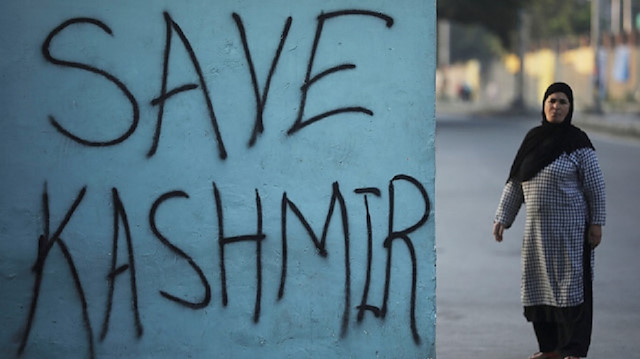
Tom Lantos Human Rights Commission hears 7 witnesses on situation in Jammu and Kashmir, minorities in India
The U.S. Congress has held a second hearing on the situation in Indian-administered Jammu and Kashmir with testimony from at least seven witnesses, including the U.S. commissioner on international religious freedom.
The livestreamed hearing Thursday was hosted by the Tom Lantos Human Rights Commission, a body co-chaired by Congressman James P. McGovern.
Observers called it "crucial" for Kashmiris.
At the hearing, McGovern urged India to allow foreign journalists into Kashmir and to restore internet access.
On Oct. 22, in an intense Capitol Hill hearing, U.S. congressmen and women criticized India’s actions in Kashmir related to barring access to foreign journalists, senators and diplomats, political detentions and the communications blockade.
Anurima Bhargava, the head of the U.S. Commission on International Religious Freedom, told the panel that cellphone and internet services are being denied to Kashmir.
She said there are reports of health care being withheld by the Indian government.
“On Aug. 5, India revoked the autonomy of Jammu and Kashmir without any legal foundation or consultation with the people. Security forces have arrested thousands of Kashmiris, including children as young as nine without cause. Family members fear that security forces may cause disappearance of their loved ones and dump their bodies in mass graves,” he said.
Kashmiri commentator Sunanda Vashisht, however, told the panel: “India's democratic credentials are unmatched.”
“India has not occupied Jammu and Kashmir … There is no India without Kashmir, and no Kashmir without India," she said.
'Whisper of a shift'
"The congressional hearing is crucial. It marks a shift in the reception to Kashmiri struggle in the U.S. At the same time, we have to be very reserved and restrained in reading it. This marks a whisper of a shift in [U.S.] policy on Kashmir but at the same time we have a huge challenge,” Kashmiri-American academic Ather Zia said in a telephone interview from the U.S. with Anadolu Agency.
She said propaganda to malign the Kashmiri struggle as "terrorism or internal disturbance in India" was “challenging.”
Responding to criticism from one of the panelists, Sethi, who teaches law at Georgetown University, told the panel: “Some of my colleagues were accused of having some agenda. This the cost of speaking truth … I do have an agenda … I am a human rights lawyer [and] I believe that everyone in this world shall have the civil and human rights respectively.”
Sethi said imposing communications blackout and the use of a lawless law Public Safety Act by India in Kashmir was “collective punishment … that we can never tolerate.”
Kashmiri Pandits have legal, political stakes in Kashmir
Haley Duschinski, director of the Center for Law, Justice and Culture at Ohio University, told the panel: “The Indian State, which is responsible for the security of civilians and property, utterly failed to protect Kashmiri Hindus' [Kashmiri Pandits] internationally recognized rights as minorities and victims of and refugees from an armed conflict.”
But she clarified that despite leaving Kashmir, several thousand Kashmiri Hindus still live harmoniously with their Muslim friends and neighbors in Kashmir.
“There has never been a full and impartial accounting about what actually caused Kashmir Pandits to leave Kashmir,” she said.
Kashmiri Pandits left Kashmir valley in early 1990s when armed resistance against Indian rule started. Official records show nearly 219 of the community members were killed in the conflict.
“It is imperative that pain and suffering of any Kashmiri community should not be instrumentalized, manipulated or weaponized against any other community,” she said, adding that Kashmiri Pandits have legal and political stakes in the future of Kashmir.
Human rights lawyer Sehla Ashai derided Indian accusations that Kashmir movement was incited by Pakistan saying Indian approach on Kashmir can be summed up: "If the facts are against you, argue the law. If the law is against you, argue the facts. If the law and facts are against you, pound the table and yell about Pakistan."
Disputed region
On Aug. 5, 2019, the Indian government scrapped the special status of Jammu and Kashmir, which was enshrined in the Indian Constitution and allowed Jammu and Kashmir to enact its own laws.
India and Pakistan both hold Kashmir in parts and claim it in full. China also controls part of the contested region, but it is India and Pakistan who have fought two wars over Kashmir.
Hello, the comments you share on our site are a valuable resource for other users. Please respect other users and different opinions. Do not use rude, offensive, derogatory, or discriminatory language.
The floor is all yours.








